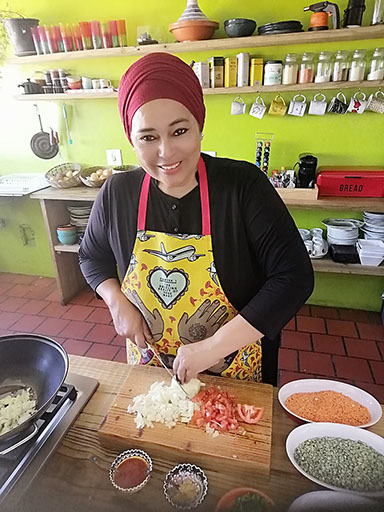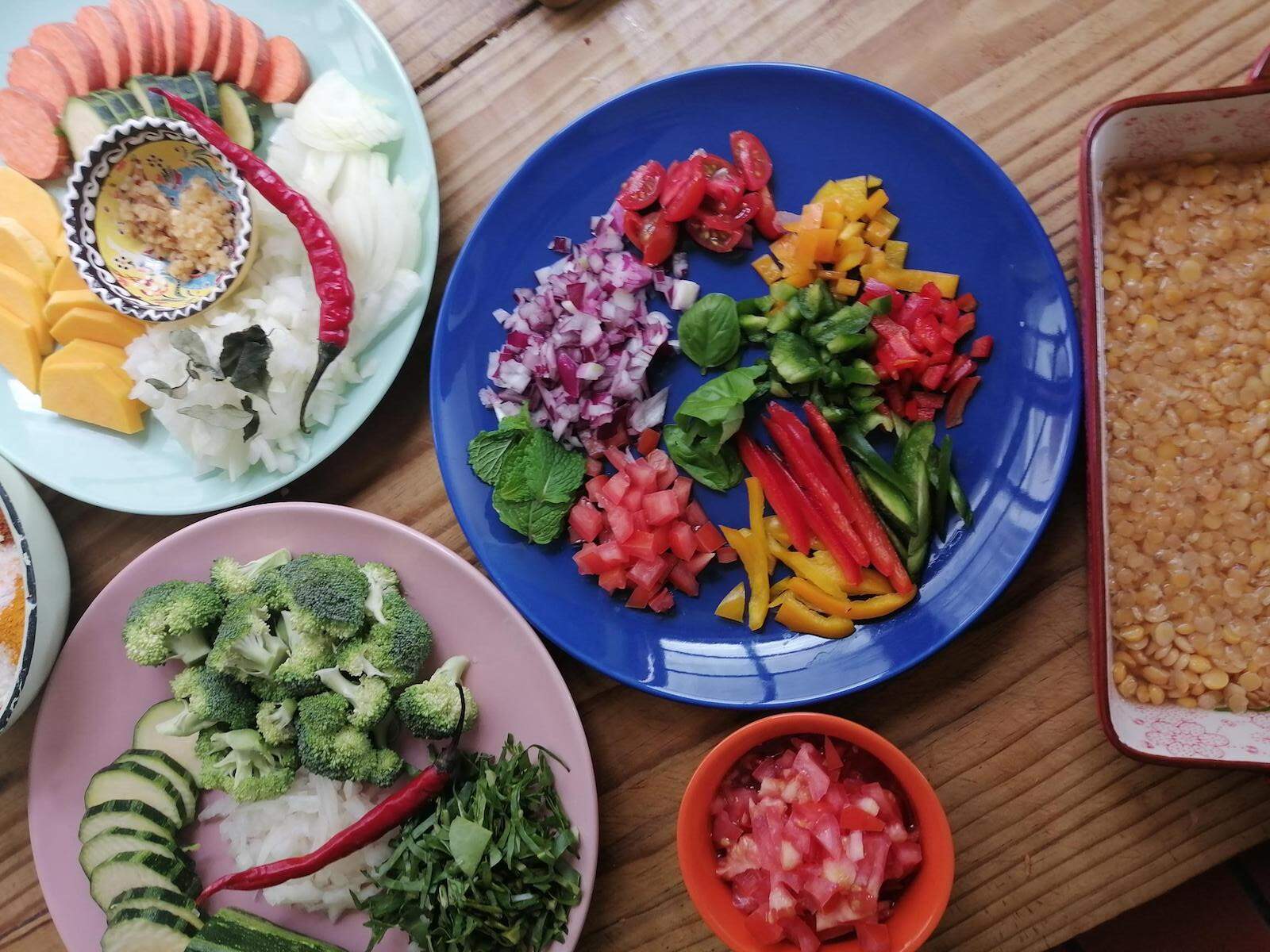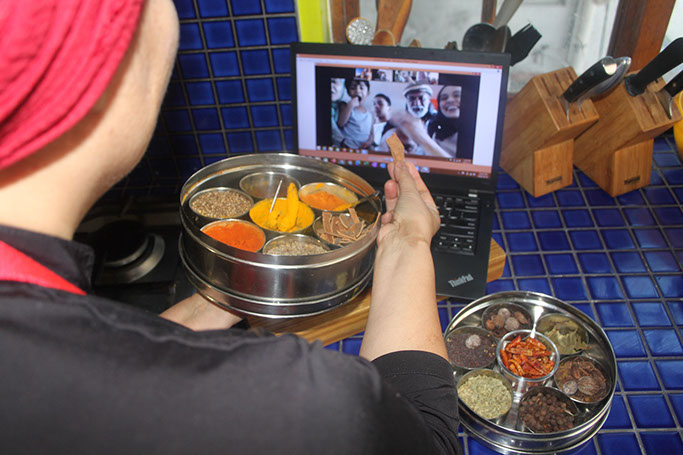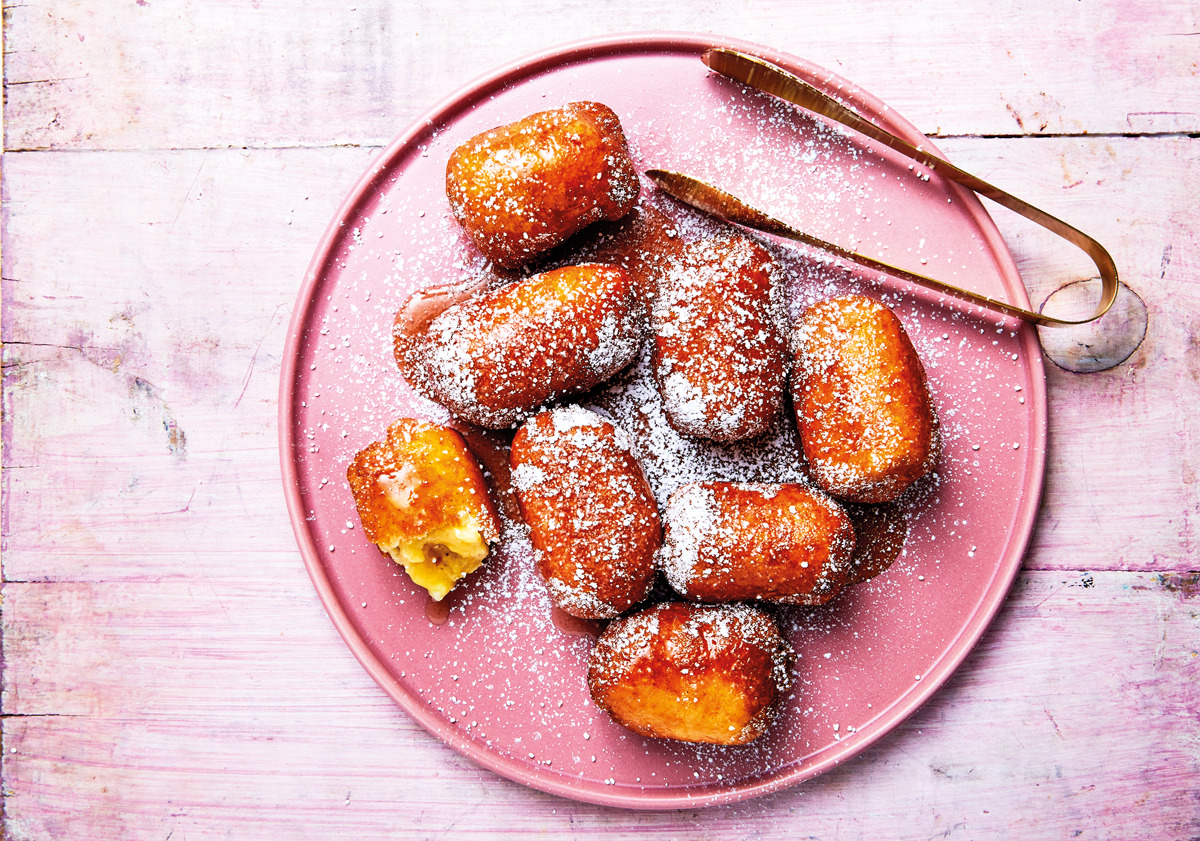How Fayruza Abrahams teaches the world to cook Cape Malay recipes
Through her business, Taste Malay, Fayruza Abrahams offered hands-on cooking classes in authentic Cape Malay cuisine to hundreds of tourists. Since the pandemic, she’s pivoted to online classes and found new ways to celebrate the food she grew up with. We chat to her about getting through the past year, how she’s celebrating Eid this year and what we can look forward to seeing her do next.
You’re very well-known for your cooking classes, but would you mind giving a little intro to your journey into food? What encouraged you to start your business, Taste Malay?
My journey with food started at a very young age. Because my both my parents worked, I found myself spending afternoons after school in our kitchen with my grandmother, grandfather and great-grandmother. My grandmother was seated most of the time as her health was starting to fail her and I essentially became an extension of her hands and feet and she would instruct me to “pass me the cumin, pass me the lentils”. Eventually as time progressed it was no longer “pass me this and that”, but “do this and do that”. Every day she taught me more and more as I grew in confidence. It was here that I learnt all the basics of Cape Malay cooking: mixing masalas, how to make a basic stew, curry, biryani, baking bread, desserts and many more. Everything was cooked from scratch, and she also taught me how to work smart and not hard, and using basic store-cupboard staples to make a comforting, hearty meal for the family.
 My grandfather, on the other hand, taught me how to clean a fish, pluck the feathers of a newly slaughtered chicken, clean tripe and trotters and cook the most delicious offal dishes. Back then, organ meats were often overlooked and discarded in favour of more desirable cuts of lamb or beef, but not in our home. We never wasted a thing and my grandparents created their own kind of magic with whatever was available. “Waste not, want not” – I can still hear my grandmother’s voice in my head. In my final year of high school, my gran suffered a severe stroke that left her bedridden and completely paralysed on her right-hand side. I took over the reins of cooking for the family, a role I performed diligently and passionately. And so my journey with food began.
My grandfather, on the other hand, taught me how to clean a fish, pluck the feathers of a newly slaughtered chicken, clean tripe and trotters and cook the most delicious offal dishes. Back then, organ meats were often overlooked and discarded in favour of more desirable cuts of lamb or beef, but not in our home. We never wasted a thing and my grandparents created their own kind of magic with whatever was available. “Waste not, want not” – I can still hear my grandmother’s voice in my head. In my final year of high school, my gran suffered a severe stroke that left her bedridden and completely paralysed on her right-hand side. I took over the reins of cooking for the family, a role I performed diligently and passionately. And so my journey with food began.
As a young adult I was fortunate to work for our national airline as a flight attendant, and for 14 years I travelled the world seeking out food experiences, taking cooking classes wherever I could, engaging with locals and their cultures. I left the airline in 2007, and then worked at TMACC for a few years. It was shortly after this that I was diagnosed with a chronic auto-immune illness. I received radioactive iodine treatment and found myself unemployed due to ill health. When my world as I knew it was spiralling out of control, I looked for comfort in the one place where I felt completely in control, my kitchen. I took a complete leap of faith diving into the culinary world. I started doing catering, baking birthday cakes and teaching people how to cook. I really had no idea that I would end up doing this on a permanent basis. Initially it was meant to be an interim job literally to survive financially while I was recovering from my illness. But I absolutely fell in love with my kitchen all over again. And soon, Taste Malay was born.
Can you tell us a little about your classes, what do you enjoy most about them?
I am an experienced host with Airbnb, Eatwith and also work privately and with a few other local companies like Culture Connect, Bo Kaap Roots, Andulela, etc. I have four different in-person experiences, each one teaching my guests the basics of Cape Malay cooking with a twist. I put all my loves in one basket by hosting these classes as I welcome guests from all over the world into my home. I also teach guests about the Cape Malay culture, my heritage, the Bo Kaap area I live in and Cape Town in general. I also host a Cape Malay fine-dining extravaganza where I showcase Cape Malay cooking in a fine-dining manner. I really enjoy this as it allows me to express my creativity in the kitchen and once again making the bland look and taste beautiful in true Taste Malay style. In April 2020, my in-person experience with Airbnb was converted into an online cooking class and I have enjoyed much success with this. I am extremely grateful that I could continue working when the pandemic was at its worst.

You’ve obviously had many international guests join your cooking classes, what are some of the responses from them about Cape Malay cuisine? Is there something that always surprises them, for example?
They are often surprised at how easy it is to cook delicious, healthy meals from scratch and sometimes with store-cupboard ingredients. Making the simple curry paste that everyone loves to buy off the shelf is a skill that they acquire during my classes and they swear they will never buy it again and cook it from scratch going forward. Learning how to fold samoosas is a fun and engaging activity and very popular and, of course, learning how to blend and mix their own unique Cape Malay masala, and the basics of using spices more confidently in their own kitchens.
The whole world was affected by the Covid-19 pandemic. What was your experience of it? How did you find pivoting to offer online classes? How did you find they were received? Are they something you’re still going to continue in the future?
Making the transition from in-person to online was fairly easy for me. Once I got the technical bits sorted, learning how to host on Zoom, adjusting my pace and simplifying the actual cooking steps, it took off! My guests absolutely love it and I do too! I realised that people love stories, and hosting these online classes were more about engagement, connecting with me, others, learning about a new culture and less about food. Yes, cooking as well and eating the lovely dishes they have prepared alongside me. I often have families and friends cooking together on special occasions like birthdays, anniversaries, Christmas, etc. Facilitating and being part of this is very fulfilling and it is these classes that I enjoy most. Bringing loved ones together who have been forced apart due to the pandemic. Hosting online allows me to experience travelling but without leaving home. I will definitely be continuing with online classes going forward for sure!

During Ramadan, what are some of your favourite traditions that you’ve continued with your family? What are some special recipes you like to make?
Sharing of food! Ramadan is about both abstinence and sustenance. Observing the fast by abstaining from eating and drinking during the day, and ensuring that neighbours, family, friends and strangers all have enough to eat. Throughout history, children of the neighbourhood would take treats to all the homes in their street, a ritual that now unfortunately has fallen by the wayside due to the pandemic. This year I will cook and makes savouries and treats and share with family, friends and neighbours for them to stock up on for use throughout the month, thus minimising contact on a daily basis. My special treats include banana fritters, baby marrow tempura chilli bites, sago pudding for breakfast, lentil and carrot soup and cheese-and-corn samoosas.
As with last year, celebrations might look a little different this year owing to the pandemic. How will you celebrate Eid this year?
Eid will still be quite different this year. While our family home is comfortable enough to host our immediate family for a quiet Eid breakfast and lunch, we will not be going from door to door in the neighbourhood to wish family and friends as is customary. A lot of families have now resorted to video calls or Zoom meetings to connect and wish each other.
Can you share what a meal might look like for celebrating Eid? What are some of your favourite things to make?
Breakfast is always big as it is the first one after observing fast for a whole month and would often look like this:
- Freshly baked ciabatta, rolls
- Ground beef pie covered with hard-boiled egg (pastei)
- Corned tongue and or beef with mustard
- Little salads of tuna, egg mayo, cheese, chicken, dates, etc.
- Tea, coffee and juices
- Mostly savouries and not often sweet treats
Late lunch or early supper:
This differs from family to family, but in general can be:
- Roast leg of lamb
- Denningvleis – lamb cutlets marinated in tamarind, vinegar, allspice, bay leaves, etc.
- Crayfish or prawn curry
- Chicken roast, butter chicken or chicken tikka masala
- The meal will be accompanied by sweet yellow rice, salads, sambals, vegetables, etc.
- Soft drinks, iced teas, lemonades, etc.
- Afternoon or evening tea:
- Fridge tarts and pudding
- Home-made Cape Malay butter biscuits
- Jam and coconut tarts
- Pavlova or cheesecake
- Selection of sweets, crackles, nuts, crisps
- Teas, coffees, juices, etc.
 Get the recipe for Fayruza's banana fritters here.
Get the recipe for Fayruza's banana fritters here.
Lastly, is there anything else you’re working on that we should keep an eye out for?
Yes! I have come up with my own brand of Cape Malay atchar that is 100% whole foods, vegan and yummy. I am slowly but surely getting it out there in different shops and delis and am proud to say that it is also on sale at LOCAL at Heritage Square in Cape Town!
The atchars come in lemon, jalapeño and mixed vegetable flavours and I would like to get my product out to the rest of South Africa and export it potentially.
In August of 2020, I self-published a cookbook called Around my Table that is currently available on Amazon in both an e-book as well as a hard copy, or it can be bought directly from me. I am currently writing a second cookbook that showcases Cape Malay desserts and savouries and would like to complete this by the end of 2021. My personal, long-term goal is to have my own Cape Malay cooking show on a Food Network channel.
To keep up with Fayruza, follow her on Instagram and find more about her cooking classes here.


Comments